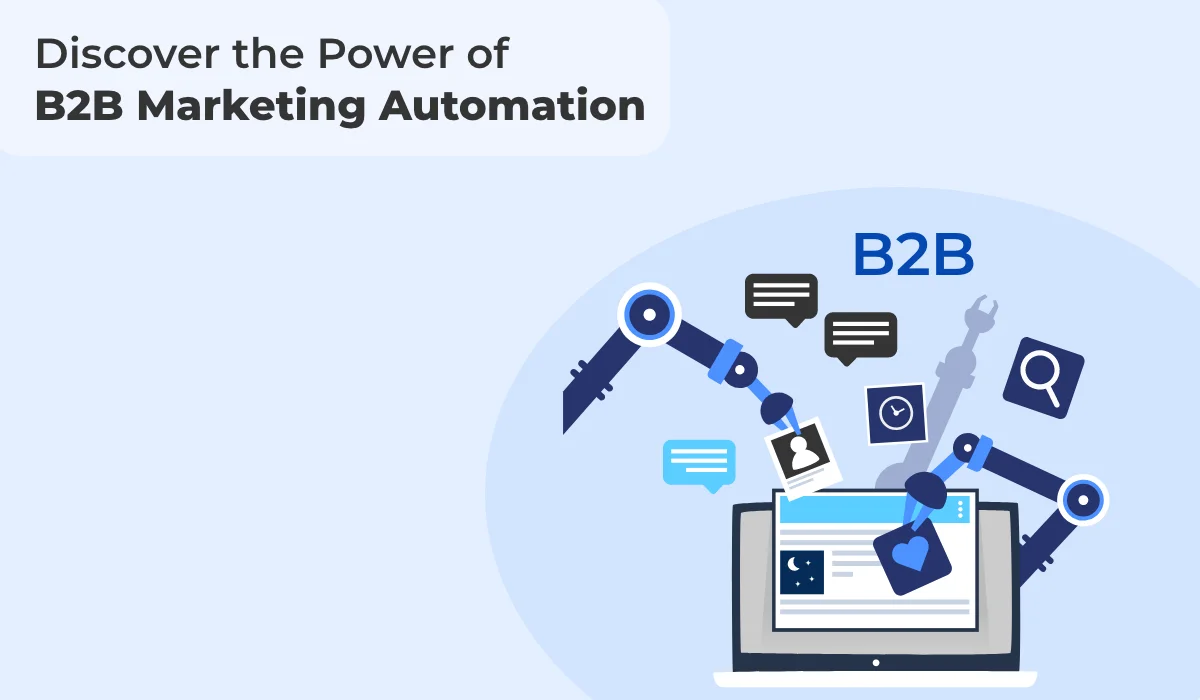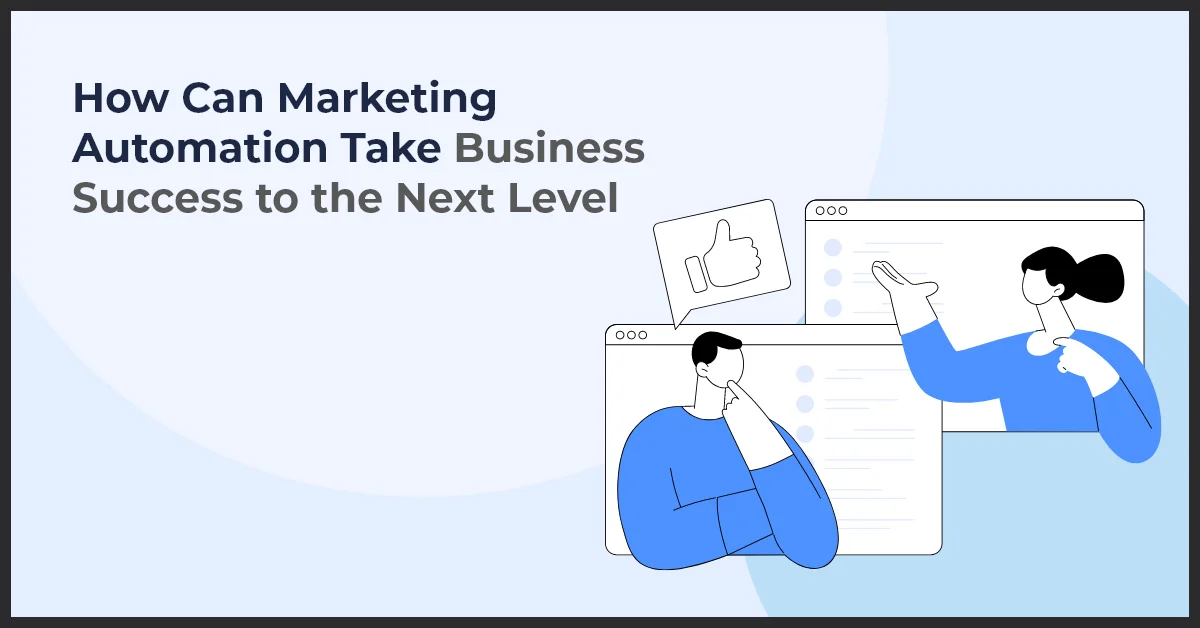Discover the Power of B2B Marketing Automation

Published on: October 30, 2023
Updated on: July 02, 2024
672 Views
- Marketing Automation
15 min read
B2B marketing automation is the secret weapon that drives the success of modern businesses. It revolutionizes the way companies engage with their audience, generate leads, and close deals. In this comprehensive guide, we will unlock the true potential of B2B marketing automation and show you how it can take your business to new heights.
First, we will dive into the definition and explanation of B2B marketing automation, demystifying the concept for beginners and seasoned professionals alike. You will gain a clear understanding of how automation streamlines and optimizes various marketing processes.
Next, we will explore the importance and benefits of integrating B2B marketing automation into your business strategy. From increased operational efficiency and enhanced lead nurturing to improved customer experience and higher conversion rates, we will uncover the countless advantages that automation brings.
Finally, our content plan will cover a range of captivating topics that will equip you with the knowledge and tools necessary to implement B2B marketing automation successfully. We will delve into key strategies, best practices, and case studies that showcase real-world examples of businesses leveraging automation to outperform their competition.
Don't miss this opportunity to harness the power of B2B marketing automation and unleash your business potential. Get ready to optimize your marketing efforts, drive growth, and achieve remarkable results.
Lead Generation with B2B Marketing Automation
Discover how B2B marketing automation can generate high-quality leads and fuel your business growth.
Generate Quality Leads on Autopilot
B2B marketing automation is a powerful tool that can enhance your lead generation efforts. By automating repetitive tasks and targeting the right audience, you can attract high-quality leads and increase your chances of converting them into valuable customers.
Identify Potential Prospects with Precision
B2B marketing automation helps you identify potential prospects by analyzing their behaviors, demographics, and preferences. With this valuable data, you can segment your audience and tailor your marketing messages to their specific needs and pain points.
Capture Prospect Information and Nurture Them Effectively
With B2B marketing automation, you can effortlessly capture prospect information through various channels and forms. Once you have their details, you can nurture them through personalized emails, relevant content, and targeted campaigns that move them smoothly through your sales funnel.
- Send automated follow-up emails to engage and educate prospects
- Create dynamic landing pages that capture leads' attention and encourage action
- Nurture leads with relevant content based on their interests and stage in the buyer's journey
- Track engagement and adjust your strategies accordingly
By automating these processes, you can save time and resources while ensuring consistent and effective lead generation.
Email Marketing
In the world of B2B marketing automation, email marketing plays a crucial role. With the integration of robust email marketing capabilities, B2B marketing automation platforms offer a comprehensive solution for businesses looking to enhance their email campaigns.
How B2B Marketing Automation Platforms Incorporate Robust Email Marketing Capabilities
B2B marketing automation platforms go beyond simple email sending by providing a wide range of features and functionalities. These platforms enable businesses to:
- Create visually appealing email templates with drag-and-drop editors
- Segment their email lists based on various criteria such as industry, company size, or engagement levels
- Automate personalized email campaigns, triggered by specific events or behaviors
- Track and measure the performance of their email campaigns with comprehensive analytics and reporting
This integration of robust email marketing capabilities empowers businesses to deliver targeted and relevant messages to their audience, enhancing the effectiveness of their email campaigns.
Benefits of Automating Personalized and Targeted Email Campaigns
Automating personalized and targeted email campaigns brings numerous benefits to businesses:
- Improved engagement and conversion rates: By delivering tailored messages to specific segments of their audience, businesses can increase the chances of capturing their attention and encouraging them to take desired actions.
- Time and resource savings: Automation allows businesses to set up email campaigns in advance, saving them valuable time and resources. They can also leverage automation to nurture leads, freeing up their teams to focus on other important tasks.
- Enhanced customer experiences: Personalized and targeted emails make customers feel valued and understood. By delivering relevant content and offers, businesses can strengthen their relationships with their audience, leading to increased loyalty and customer satisfaction.
Examples of How Businesses Can Use Email Automation
Email automation can be utilized in various ways to achieve different marketing goals. Here are a few examples:
- Nurturing leads: Businesses can set up automated email sequences to educate and engage leads, gradually moving them through the sales funnel.
- Promoting products/services: By creating automated email campaigns featuring new products or services, businesses can generate interest and encourage conversions.
- Driving conversions: Automated emails can be triggered based on specific actions, such as cart abandonment or product recommendations, to drive more conversions.
By leveraging the power of email automation, businesses can streamline their marketing efforts, maximize their ROI, and achieve greater success in their B2B marketing endeavors.
CRM Integration
Integrating marketing automation with CRM systems is crucial for B2B companies. By integrating these two powerful tools, businesses can effectively track and manage customer interactions, providing a seamless experience.
One of the key advantages of CRM integration is the ability to streamline sales processes. When marketing automation and CRM systems are linked, sales teams can access valuable customer data and insights, enabling them to prioritize leads and identify potential opportunities. This integration helps the sales team work more efficiently, ultimately leading to increased conversions and revenue.
Furthermore, CRM integration allows businesses to have a comprehensive view of their customers' journey. From the first interaction to the final sale, every touchpoint is recorded and organized within the CRM system. This complete record ensures that all customer interactions are properly tracked, providing valuable insights for future marketing campaigns and sales strategies.
Additionally, CRM integration enhances the customer experience. With the integration in place, businesses can deliver personalized and tailored messaging to their audience. By leveraging customer data captured in the CRM system, marketers can create targeted campaigns and offers, ensuring that each interaction feels relevant and valuable to the customer.
Workflow Automation
Streamlining various marketing workflows using B2B marketing automation
Workflow automation is a key component of B2B marketing automation, allowing businesses to streamline and automate various marketing processes. By leveraging automation, marketers can save time, reduce manual effort, and improve overall marketing efficiency.
Examples of workflows that can be automated include:
- Lead scoring and nurturing: With B2B marketing automation, leads can be automatically scored based on predetermined criteria, allowing marketers to focus their efforts on the most qualified leads. Nurturing campaigns can also be automated, ensuring that leads receive relevant and timely information to move them through the sales funnel.
- Campaign management: B2B marketing automation platforms offer robust campaign management tools that allow marketers to automate various aspects of their campaigns, such as email sends, social media postings, and landing page creation.
- Content distribution: Distributing content across various channels, such as blogs, social media, and email, can be a time-consuming task. With B2B marketing automation, marketers can automate the distribution process, ensuring that their content reaches the right audience at the right time.
- Social media scheduling: B2B marketing automation platforms often include social media scheduling functionality, allowing marketers to schedule posts in advance and maintain a consistent presence on social media.
Workflow automation has a significant impact on marketing efficiency and effectiveness. By automating repetitive tasks, marketers can focus their time and energy on more strategic activities, such as campaign planning and optimization. This not only saves time but also allows marketers to deliver more personalized and relevant experiences to their target audience.
Analytics and Reporting
Collecting and analyzing data with B2B marketing automation platforms
One of the key benefits of implementing a B2B marketing automation platform is the ability to collect and analyze extensive amounts of data. With the right tools in place, you can track various metrics and gain valuable insights into your marketing efforts.
Insights provided by analytics, including campaign performance, lead behavior, conversion rates, and ROI
- Campaign Performance: Analytics provide detailed information about the performance of your marketing campaigns. You can track metrics such as open rates, click-through rates, and engagement levels to understand which campaigns are most effective in generating leads and driving conversions.
- Lead Behavior: By leveraging marketing automation analytics, you can gain insights into how your leads interact with your content. You can track their behavior throughout the buyer's journey, from the first touchpoint to conversion, allowing you to understand their preferences, interests, and pain points.
- Conversion Rates: Analytics help you measure the effectiveness of your conversion strategies. By analyzing conversion rates at different stages of the marketing funnel, you can identify areas for improvement and optimize your efforts to maximize conversions.
- ROI: With marketing automation analytics, you can track the return on investment (ROI) of your marketing activities. By measuring the revenue generated by your campaigns and comparing it to the cost of implementation, you can assess the effectiveness and profitability of your marketing efforts.
How reporting features help measure and optimize marketing strategies
In addition to analytics, B2B marketing automation platforms often offer robust reporting capabilities. These reporting features help you visualize and present your data in a meaningful way, facilitating decision-making and strategy optimization.
By generating reports on key performance indicators (KPIs), you can easily identify trends, spot opportunities, and address potential issues. The ability to track and report on various metrics helps you make data-driven decisions, refine your marketing strategies, and allocate resources efficiently.
Personalization and Segmentation
In order to effectively target your audience and deliver personalized marketing messages, B2B marketing automation allows you to segment your target audience based on various criteria. By dividing your audience into specific segments, you can tailor your marketing efforts to meet their specific needs and preferences.
Segmentation can be based on various factors such as industry, job title, company size, location, or previous interactions with your brand. By understanding and categorizing your audience, you can send targeted messages that are more likely to resonate with them and drive engagement.
Personalization is another important aspect of B2B marketing automation. It involves tailoring your marketing messages to individual recipients, making them feel more relevant and personalized.
Through personalization, you can address recipients by their names, reference their previous interactions or purchases, and provide content that aligns with their specific interests or pain points. This level of personalization helps to create a stronger connection with your audience and increases the chances of conversion.
Personalization and segmentation work hand in hand to deliver more relevant content to your audience. By sending targeted messages that are personalized to each individual, you can deliver content that is more likely to resonate with them, increasing engagement and ultimately conversion rates.
Multi-channel Marketing
Executing marketing campaigns across multiple channels with B2B marketing automation
Multi-channel marketing is a crucial component of B2B marketing automation. It involves reaching out to your target audience through various channels simultaneously to maximize your reach and improve your campaign's effectiveness.
With B2B marketing automation, you can easily integrate and automate your marketing efforts across multiple channels. This allows you to deliver consistent messaging and engage with your audience wherever they are.
Examples of channels used:
- Email: Sending personalized emails to nurture leads and keep customers informed
- Social media: Engaging with your audience on platforms like Facebook, Twitter, and LinkedIn
- Search engines: Optimizing your website for search engines to increase visibility
- Websites: Creating landing pages and optimizing your website to convert visitors into leads
- Offline channels: Utilizing offline marketing channels such as events, direct mail, and print advertising
By utilizing these different channels, you can target your audience at various touchpoints throughout their buyer's journey. This not only improves brand recognition but also increases the chances of conversion.
Consistency is key in multi-channel marketing. B2B marketing automation ensures that your messaging remains consistent across all channels, creating a seamless experience for your audience. It allows you to maintain a cohesive brand image and reinforce your value proposition.
Additionally, multi-channel marketing allows you to maximize your reach. By being present on multiple platforms, you can capture the attention of a wider audience and generate more leads. It also gives you the opportunity to engage with different segments of your target audience, tailoring your messaging to their specific needs and interests.
With B2B marketing automation, you can easily execute multi-channel marketing campaigns, saving time and effort. It allows you to manage and track your campaigns from a centralized platform, making it easier to analyze and optimize your marketing efforts.
Account-Based Marketing (ABM)
Account-Based Marketing (ABM) is a strategy that focuses on targeting specific accounts or companies instead of casting a wide net. This approach has gained popularity in B2B marketing due to its ability to personalize and tailor marketing efforts toward key accounts and decision-makers.
B2B marketing automation plays a crucial role in supporting ABM strategies. With automation, marketers can easily identify and prioritize target accounts based on various criteria such as firmographics, past interactions, and buying signals. This allows for more efficient and effective outreach, ensuring that the right message reaches the right audience at the right time.
Automation platforms provide a range of tools that streamline ABM efforts. For instance, these platforms enable marketers to deliver personalized content to target accounts, tailoring messaging and offers based on their specific needs and pain points. This level of personalization helps to build stronger relationships and increases the chances of conversion.
In addition, automation platforms offer tracking and analytics capabilities that allow marketers to measure the effectiveness of their ABM campaigns. Marketers can track engagement metrics such as click-through rates, open rates, and conversions to understand how well their ABM efforts are performing. These insights help in refining and optimizing ABM strategies for better results.
Sales and Marketing Alignment
Aligning and collaborating between sales and marketing teams is crucial for the success of B2B marketing automation. By working together, these two departments can effectively generate and nurture leads, resulting in increased conversions and revenue.
Importance of aligning and collaborating between sales and marketing teams with B2B marketing automation
With B2B marketing automation, sales and marketing teams can align their efforts and ensure a smoother transition from lead generation to closing deals. This alignment allows for a more targeted and personalized approach, increasing the chances of converting leads into customers.
Shared visibility into lead data and its impact on smoother lead handoffs
Through B2B marketing automation, both sales and marketing teams have access to shared visibility into lead data. This shared visibility enables a seamless handoff of leads between the two departments, eliminating miscommunication and reducing the chances of leads slipping through the cracks.
Fostering a coordinated approach to sales and marketing efforts
By aligning sales and marketing efforts, B2B marketing automation fosters a coordinated approach. Both departments can work together to create targeted campaigns, personalized messaging, and effective follow-ups, ultimately driving better results and maximizing the return on investment.
Content Marketing
B2B marketing automation provides extensive support for content creation, distribution, and tracking. With its robust capabilities, businesses can streamline their content marketing efforts and achieve better results.
One of the key advantages of using B2B marketing automation for content marketing is the ability to deliver relevant and valuable content at different stages of the buyer's journey. By leveraging data and insights gathered through automation, businesses can understand the specific needs and interests of their target audience and tailor their content accordingly.
This personalized approach ensures that prospects receive the right information at the right time, increasing the chances of conversions and nurturing leads toward a purchase decision.
Furthermore, B2B companies can utilize content marketing as a powerful tool to increase brand awareness and establish thought leadership within their industry. By consistently delivering high-quality content that provides value to their audience, businesses can position themselves as experts and build credibility among their target market.
Through effective content marketing strategies, B2B companies can not only attract and engage their audience but also foster long-term relationships and loyalty with their customers.
Conclusion
In conclusion, B2B marketing automation is a powerful tool that can significantly enhance and streamline your marketing efforts. Throughout this content plan, we have covered various aspects of B2B marketing automation, including lead generation, email marketing, CRM integration, workflow automation, analytics and reporting, personalization and segmentation, multi-channel marketing, account-based marketing (ABM), sales and marketing alignment, and content marketing.
By implementing marketing automation software, businesses can benefit from improved efficiency, increased productivity, and better customer engagement. With automation, repetitive tasks can be automated, allowing marketing teams to focus on strategic and creative initiatives.
In today's competitive landscape, the importance of B2B marketing automation cannot be overstated. It provides a competitive edge by enabling personalized and targeted marketing campaigns, nurturing leads, and optimizing the customer journey.
We encourage businesses of all sizes to explore and implement marketing automation software. Whether you are a small startup or a large enterprise, marketing automation can help you achieve your business goals and drive growth.
Take advantage of the capabilities offered by marketing automation technology and stay ahead of your competition. Start your journey towards more effective and efficient B2B marketing today!



